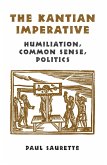The categorical imperative is the central philosophical concept in the moral philosophy of Immanuel Kant, as well as modern deontological ethics. Introduced in Kant's Groundwork for the Metaphysics of Morals, it may be defined as the standard of rationality from which all moral requirements are derived. According to Kant, human beings occupy a special place in creation, and morality can be summed up in one ultimate commandment of reason, or imperative, from which all duties and obligations derive. He defined an imperative as any proposition that declares a certain action (or inaction) to be necessary. A hypothetical imperative compels action in a given circumstance: if I wish to quench my thirst, I must drink something. A categorical imperative, on the other hand, denotes an absolute, unconditional requirement that asserts its authority in all circumstances, both required and justified as an end in itself. It is best known in its first formulation: "Act only according to that maxim whereby you can at the same time will that it should become a universal law."
Bitte wählen Sie Ihr Anliegen aus.
Rechnungen
Retourenschein anfordern
Bestellstatus
Storno








